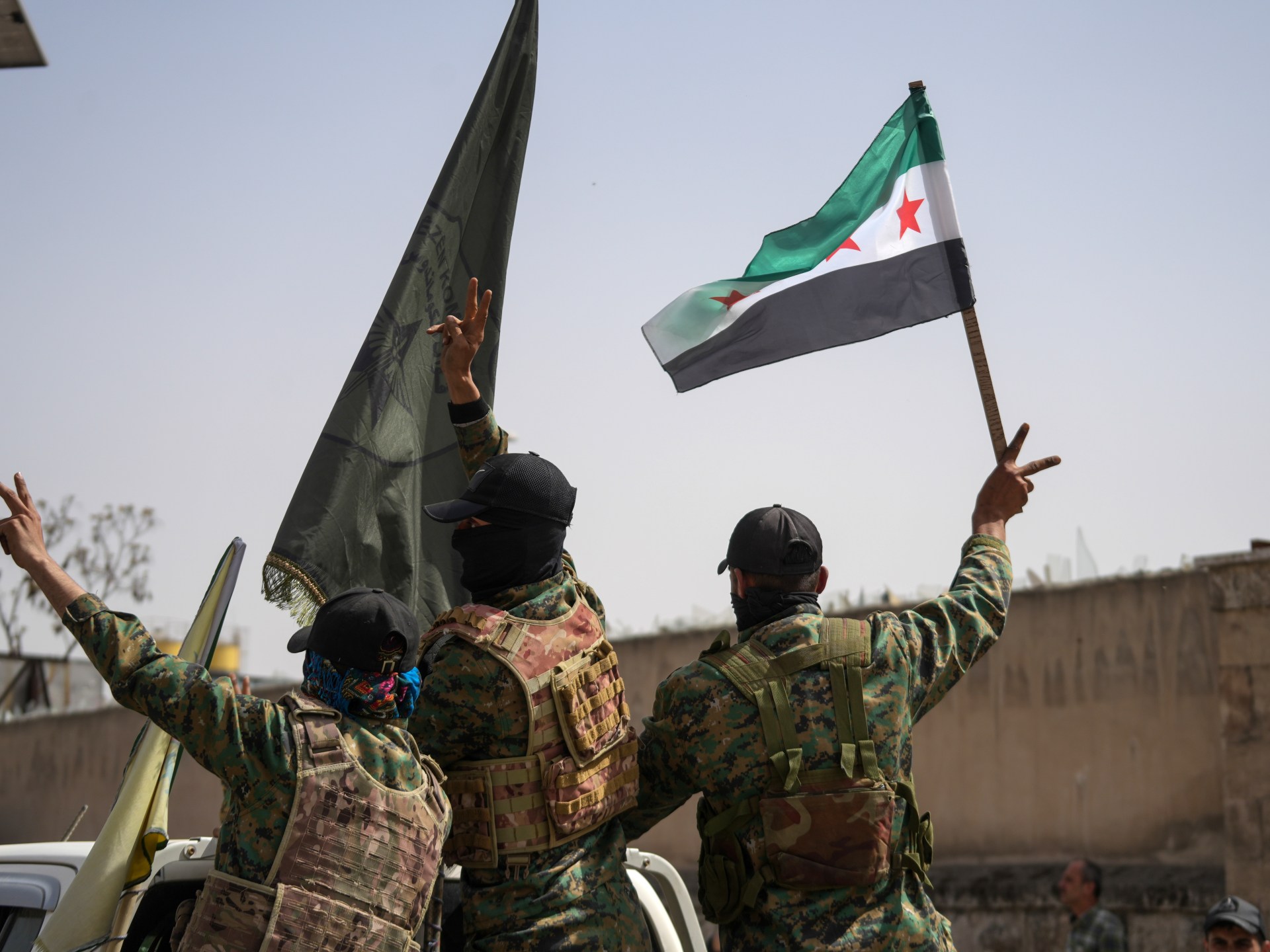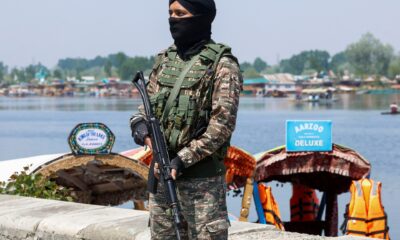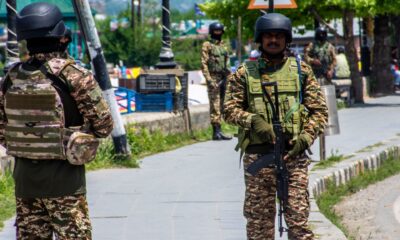Conflict Zones
‘Traitors’: Hate-filled songs target Indian Muslims after Kashmir attack | Islamophobia News

Mumbai, India – Less than 24 hours after news broke of the April 22 attack, in which gunmen killed 25 tourists and a local pony rider in the Indian-administered Kashmir region, a new song surfaced on Indian YouTube.
Its message was unmistakable:
We made a mistake by allowing you to stay on,
You got your own country, why didn’t you leave then?
They call us Hindus “kaffirs”,
Their hearts are full of conspiracies against us.
The song, titled “Pehle Dharam Pocha” (They Asked About Religion First) targeted Indian Muslims, insisted they were conspiring against Hindus and asked them to leave India. In less than a week, the song has garnered more than 140,000 views on YouTube.
And it is not the only song. The killings in the picturesque resort town of Pahalgam marked the worst attack against tourists in Kashmir in a quarter of a century. But even as New Delhi hits back against Pakistan, which it accuses of links to the attack – a charge Islamabad denies – a wave of incendiary music tracks, crafted and circulated within hours, has set off an anti-Muslim backlash in India.
Set to pulsing beats and catchy rhymes, these songs, part of a genre that has come to be known as Hindutva Pop, are calling for violent retribution for the attack. From songs that label Indian Muslims as “traitors” to songs that advocate their boycott, the country’s smartphones are buzzing. Hindutva is the Hindu majoritarian political ideology of Prime Minister Narendra Modi’s governing Bharatiya Janata Party (BJP) and its allies.
Al Jazeera found at least 20 songs that carried and amplified such Islamophobic themes at a time when Indians were anxiously scrolling through their digital feeds for more information on the aftermath of the attack.
These songs have a chillingly consistent narrative: Since the attackers are believed to have singled out Hindu tourists, Indian Muslims can no longer be trusted – never mind that a Muslim Kashmiri pony rider who tried to stop the gunmen was also killed.
Apart from these, a glut of other hyper-nationalist songs has also emerged in the past week, pushing warmongering rhetoric deeper into Indian digital veins. There are songs that call for Pakistan to be nuked or for the Indian government to “wipe Pakistan off the map”, and others that advocate for “Pakistani blood” in exchange for the deaths,
These songs have become a part of a broader digital push by Hindutva groups, who are using social media and encrypted platforms like WhatsApp to stoke fear, hatred, and division among Indians – all at a time when tensions with neighbouring Pakistan are ratcheting up.
This campaign is mirroring real-world violence, across multiple Indian states. In Uttar Pradesh, Haryana, Maharashtra and Uttarakhand, Muslims have faced brutal attacks and threats. Kashmiri Muslims have been evicted from their homes, street vendors assaulted, and in chilling acts of retribution, Muslim patients have been denied medical care by Hindu doctors.
On Friday, a Muslim man was shot dead, with a Hindu supremacist in Agra, Uttar Pradesh, claiming responsibility for the shooting and saying it was retribution for the Pahalgam attack.
Concerted campaign
All the 20 songs that Al Jazeera analysed saw a common theme being pushed: a reiteration of the assertion that tourists were killed for their Hindu identities, and therefore, Hindus across the country must now feel threatened in living around Muslims. Multiple witness and survivor accounts of the Pahalgam attack suggest that the gunmen asked the tourists to recite the Kalimas (sacred Islamic verses) and the men who could not do so were shot.
The song Pehle Dharm Poocha (They Asked About Religion First) was released on April 23, the day after the attack. Singer Kavi Singh insists that letting Muslims stay on in India after the country’s partition in 1947 was “a mistake”, and asks them to go to Pakistan.
Another song, Ab Ek Nahi Huye Toh Kat Jaaoge (If You Don’t Unite Now You Will be Slaughtered), by singer Chandan Deewana, is addressed entirely to Hindus, asking them to rise up and “save our religion”. The song insists that Hindus, not Indians, are under threat and warns that they will be “slaughtered” if they do not unite. It has garnered more than 60,000 views on YouTube in just two days.
Jaago Hindu Jaago (Wake Up, Hindus) is a song that asks Hindus to identify “traitors within the country”, a coded reference to Muslims. The song’s video on YouTube contains an AI-re-enactment of the Pahalgam attack and has more than 128,000 views so far.
Another song, Modi Ji Ab Maha Yudh Ho Jaane Do (Modi ji, Let The Great War Begin), refers to Muslims as “snakes” living in India. Another song calls the events in the country a “religious war”, and yet another asks for Hindus in India to be allowed to carry arms.
These songs provide a background score for social media posts that bear similar themes.
From AI-generated videos and memes recreating the attack to Ghibli images, social media timelines have seen a flood of content emerging from the attack. Much of it carries similar undertones: to paint the attack as an assault on Hindus and the Hindu religion, while exhorting Hindus to “unite” against the threat of Muslims.
Some posts liken the Pahalgam killings to the October 7, 2023, attacks on Israel by Hamas and other Palestinian armed groups, and exhort the Indian government to “take revenge the Israel way”. Israel launched a war on the Gaza Strip that has, since October 2023, killed more than 52,000 Palestinians and wounded more than 117,000 others.
Raqib Hameed Naik, the executive director of the Washington, DC-based Center for the Study of Organized Hate (CSOH), which tracks hate speech in India, said the centre has observed “a sharp spike” in anti-Muslim rhetoric on social media since the Kashmir attack.
“The [Muslim] community is frequently portrayed as an existential threat through memes, AI-generated images, videos and misinformation, systematically designed to inflame passions and justify exclusionary rhetoric,” Naik said.
In addition to the 20 songs that Al Jazeera identified, there is a plethora of songs on YouTube abusing Pakistan (one song’s title is “Pakistan, You M***********”, and it has garnered more than 75,000 views). The videos accompanying some of these songs feature military simulation videos of air strikes, soldiers in combat and tanks firing munitions.
Some of them even feature the singers dressed in military fatigues and camouflage face paint, with one singer holding a rifle throughout the video.
Offline hate and violence
Since the Kashmir attack, there have been multiple incidents of violence on the streets, targeting Kashmiri and other Muslims across the country.
The Association For Protection Of Civil Rights (APCR), a civil rights advocacy group consisting of lawyers and human rights activists, has recorded 21 incidents of anti-Muslim violence, intimidation and hate speech across the country in the days after April 22.
These include assaulting Kashmiri women and students, delivering hate speeches against Muslims in public rallies and asking the Indian government to replicate Israel’s actions in Palestine against Kashmiris – as well as evicting Kashmiri students from their rented homes and hostels.
“Indians are being bombarded by this hateful campaign, which uses the attack as a base,” said Nadeem Khan, the general secretary of APCR. “This campaign has taken the country’s temperature to its boiling point.”
APCR, he said, was now in the process of arranging legal aid for victims of the post-attack violence.
Members of Modi’s BJP have been linked to some of the hate speech and violence.
One BJP minister in the western state of Maharashtra, Nitesh Rane, called for an economic boycott of Muslims, while addressing a public event attended by hundreds last week. “If they are behaving this way about religion, then why should we buy things from them and make them rich? You people will have to take a pledge that whenever you make any purchase, you should buy it only from a Hindu,” Rane told the gathering.
Another BJP legislator entered Jaipur city’s Jama Masjid and pasted offensive posters inside the premises of a mosque, during a protest against Pakistan for its involvement in the Kashmir attack. A group of BJP leaders in Mumbai were booked by the police for abusing and assaulting Muslim hawkers in central Mumbai.
In addition, leaders of the BJP as well as its ideological affiliates, the Bajrang Dal and the Vishwa Hindu Parishad, have also been organising protests against Pakistan, often indulging in anti-Muslim hate speeches in the process.
The Washington DC-based CSOH has recorded at least 10 hate speech events since April 22, where participants have threatened Muslims with violence, advocated for a boycott of Muslims, asked Hindus to arm themselves and even warned Kashmiri Muslims to leave, failing which they would “face consequences”.
Naik, from CSOH, said that the online hate campaign against Muslims had sought to “justify” this violence.
“This follows a longstanding pattern where certain domestic or international incidents are weaponised to demonise Muslims and promote hate and violence against them in India,” he said.
Conflict Zones
Roadside bomb blast kills 26 in Nigeria’s restive northeast | Conflict News

Violence reportedly flaring up in region long plagued by ISIL affiliate in West Africa Province (ISWAP) and Boko Haram.
At least 26 people have been killed as a truck hit an improvised explosive device in Nigeria’s restive northeast.
The blast on Monday killed men, women and children in Borno State, near the border with Cameroon, according to the military and residents. The region has been plagued for decades by armed groups including the ISIL affiliate in West Africa Province (ISWAP) and Boko Haram, with violence flaring up in recent days.
“Twenty-six people died in the blast, comprising of 16 men, four women and six children,” a military officer speaking on condition of anonymity told the AFP news agency, adding that three further passengers were severely injured.
Borno State police offered no immediate comment.
The International NGO Safety Organisation, which provides security to foreign nongovernmental organisations in northeast Nigeria, said in an internal memo seen by the Reuters news agency that vehicles moving between the towns of Rann and Gamboru Ngala hit an IED.
“I took part in the funeral of the 26 people killed in the explosion; most of them were burned beyond recognition,” Akram Saad, a resident of the nearby town Rann, told AFP.
A video showed rows of bodies in white plastic bags laid on the floor of the morgue at Rann’s general hospital.
No one has claimed responsibility for the attack. But Abba Amma Muhammad, whose mother was killed, blamed the incident on Boko Haram.
Boko Haram’s uprising has plagued northeast Nigeria for the past 15 years, killing more than 40,000 people. The government has asserted that the groups are largely defeated, despite the persisting attacks.
ISWAP is also active in northern Borno and has launched sporadic ambushes on convoys and planted landmines along its highways.
The blast comes amid a flare-up of violence in northeast Nigeria in recent days, with the death toll rising to at least 50 people.
Boko Haram killed about 10 “vigilantes” from the Civilian Joint Task Force (CJTF) in the state of Adamawa, sources reported earlier on Monday, according to AFP.
On Thursday, the group killed 14 farmers in Borno’s Gwoza district, a local official said.
Borno State governor Babagana Umara Zulum on Friday told Nigeria’s defence minister and military chiefs that Boko Haram and ISWAP were entrenching themselves in Lake Chad islands, Sambisa Forest and Mandara mountains on the border with Cameroon as a result of “military setbacks”.
Conflict Zones
Hezbollah leader says Lebanese gov’t must do more to end Israeli attacks | Hezbollah News

Naim Qassem’s comments came as the Israeli military said it carried out more than 50 strikes in Lebanon this month.
Hezbollah leader Naim Qassem has called on Lebanon’s government to work harder to end Israel’s daily attacks in the country, a day after an Israeli air strike targeted the southern suburbs of the capital Beirut for the third time since a ceasefire was agreed late last November.
Qassem said in a televised speech on Monday that Hezbollah implemented the ceasefire deal that ended the 14-month war, but Israel has continued to launch relentless air strikes.
Qassem’s comments came as the Israeli military said it carried out more than 50 strikes in Lebanon this month in response, it says, to threats against Israel and Hezbollah allegedly violating the United States-brokered ceasefire.
Rights groups have denounced Israeli attacks on Lebanon, saying they are violating the truce deal.
On Sunday, Israeli warplanes struck Beirut’s southern suburbs after issuing a warning about an hour earlier, marking the third Israeli strike on the area since the November ceasefire. The Israeli military said it struck a precision-guided missiles facility.
‘Put pressure on America’
Following the strike, Lebanese President Joseph Aoun accused Israel of undermining stability in Lebanon and escalating tensions. He said Israeli attacks pose “real dangers to the security” of the region.
“Yesterday, an aggression targeted the southern suburbs of Beirut. This attack lacks any justification … It is a political attack aimed at changing the rules by force,” Qassem said of Sunday’s attack.
“The resistance complied 100 percent with the [ceasefire] deal and I tell state officials that it’s your duty to guarantee protection,” Qassem said, adding that Lebanese officials should contact sponsors of the ceasefire so that they put pressure on Israel to cease its attacks.
“Put pressure on America and make it understand that Lebanon cannot rise if the aggression doesn’t stop,” Qassem said, pointing to Lebanese officials. He added that the US has interests in Lebanon and “stability achieves these interests”.
Qassem said the priority should be for a full Israeli withdrawal from Lebanon, an end to Israeli strikes in the country, and the release of Lebanese people held in Israel since the war officially ended on November 27.
Hezbollah began launching rockets, drones and missiles into Israel the day after its ally Hamas led the October 7, 2023 attack and Israel responded with mass bombardment of Gaza. About 1,200 people in Israel were killed and another 251 others were abducted during the attack in southern Israel.
The war ignited further last September when Israel carried out waves of air strikes across Lebanon and assassinated most of the group’s senior leaders, including Hassan Nasrallah. The fighting killed more than 4,000 people in Lebanon, most of them civilians.
The Lebanese government said earlier this month that 190 people have been killed and 485 injured in Lebanon by Israeli strikes since the ceasefire took effect.
Conflict Zones
ISIL group kills five Kurdish fighters in attack in eastern Syria | ISIL/ISIS News

Syria’s Kurdish-led Syrian Democratic Forces described the attack as ‘one of the deadliest’ against it in a while.
The ISIL (ISIS) group has killed five Kurdish fighters in an attack in eastern Syria’s Deir Az Zor, the group’s news agency has reported, underscoring concerns about its resurgence.
Farhad Shami, spokesperson for Syria’s Kurdish-led Syrian Democratic Forces (SDF), confirmed to Reuters news agency on Monday that five of its members were killed in the attack, which he described as “one of the deadliest” against the group in a while.
Deir Az Zor city was captured by ISIL in 2014, but the Syrian army retook it in 2017.
The ISIL group once controlled vast swathes of Syria and Iraq – including Raqqa, about 160km (100 miles) east of Aleppo and Mosul, in northern Iraq – imposing hardline rule over millions of people.
Former ISIL leader Abu Bakr al-Baghdadi had declared a caliphate over the two countries in 2014 before he was killed in a raid by United States special forces in northwest Syria in 2019 as the group collapsed.
At its peak, the group ruled over an area half the size of the United Kingdom and was notorious for its brutality. It beheaded civilians, slaughtered 1,700 captured Iraqi soldiers in a short period, and enslaved and raped thousands of women from the Yazidi community, one of Iraq’s oldest religious minorities.
A coalition of more than 80 countries, led by the US, was formed to fight the group in September 2014. The alliance continues to carry out raids against ISIL’s hideouts in Syria and Iraq.
The war against the group officially ended in March 2019, when US-backed and Kurdish-led fighters of the SDF captured the eastern Syrian town of Baghouz, which was the last sliver of land ISIL controlled.
The group was also defeated in Iraq in July 2017, when Iraqi forces recaptured Mosul. Three months later, ISIL suffered a major blow when the SDF took back the Syrian northern city of Raqqa, which was the group’s de facto capital.
ISIL has recently been trying to stage a comeback, continuing to recruit members and to claim responsibility for deadly attacks around the world.
-

 Europe2 days ago
Europe2 days agoFrancis celebrated as ‘pope among the people’ in Vatican funeral attended by massive crowd
-

 Sports2 days ago
Sports2 days agoNew England Patriots make Kobee Minor this year’s ‘Mr. Irrelevant’
-

 Lifestyle1 day ago
Lifestyle1 day agoHow bugs and beet juice could play roles in the race to replace artificial dyes in food
-

 Conflict Zones1 day ago
Conflict Zones1 day ago‘Burst balloon’: How Pahalgam attack shattered Modi’s Kashmir narrative | Narendra Modi News
-

 Middle East2 days ago
Middle East2 days agoFires continue to burn as Iran probes deadly explosion at key port | Energy News
-

 Conflict Zones1 day ago
Conflict Zones1 day agoIndia and Pakistan continue to trade fire across Kashmir border | Conflict News
-

 Middle East23 hours ago
Middle East23 hours agoDeadly US strike hits Yemeni migrant centre | Israel-Palestine conflict News
-

 Europe2 days ago
Europe2 days agoLiverpool secures historic Premier League title after beating Tottenham




